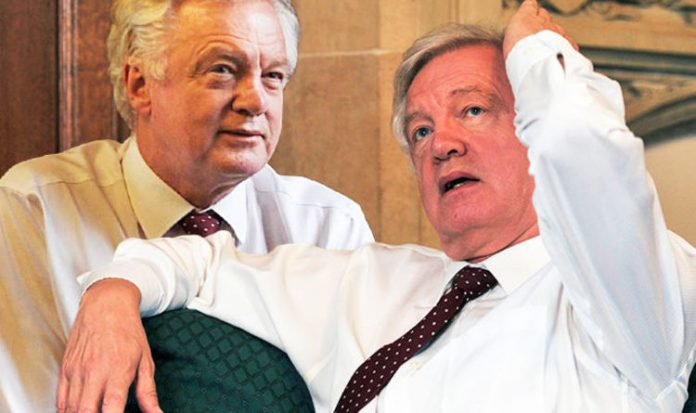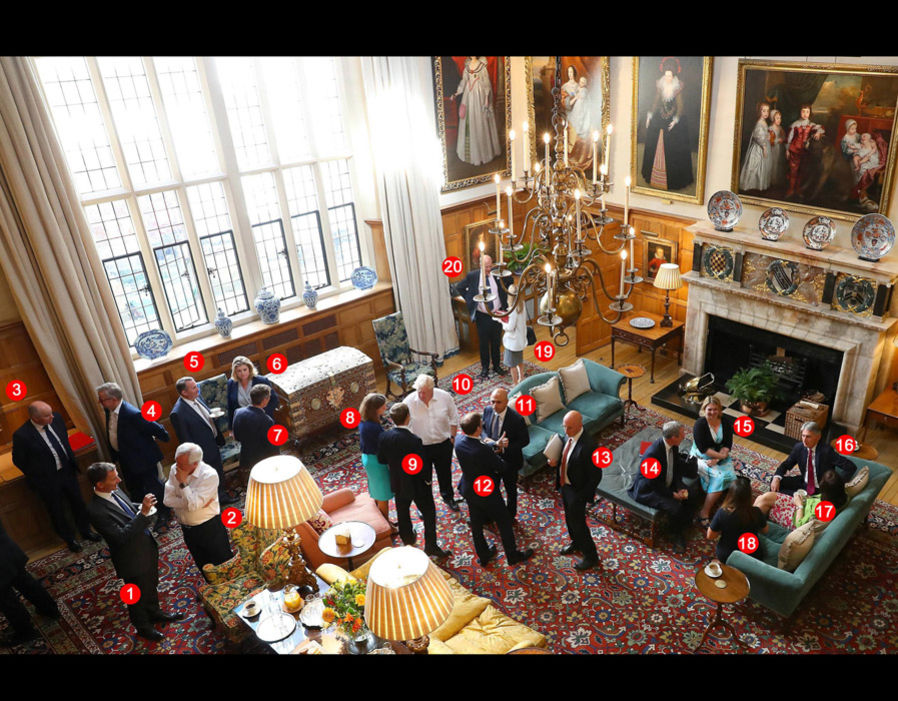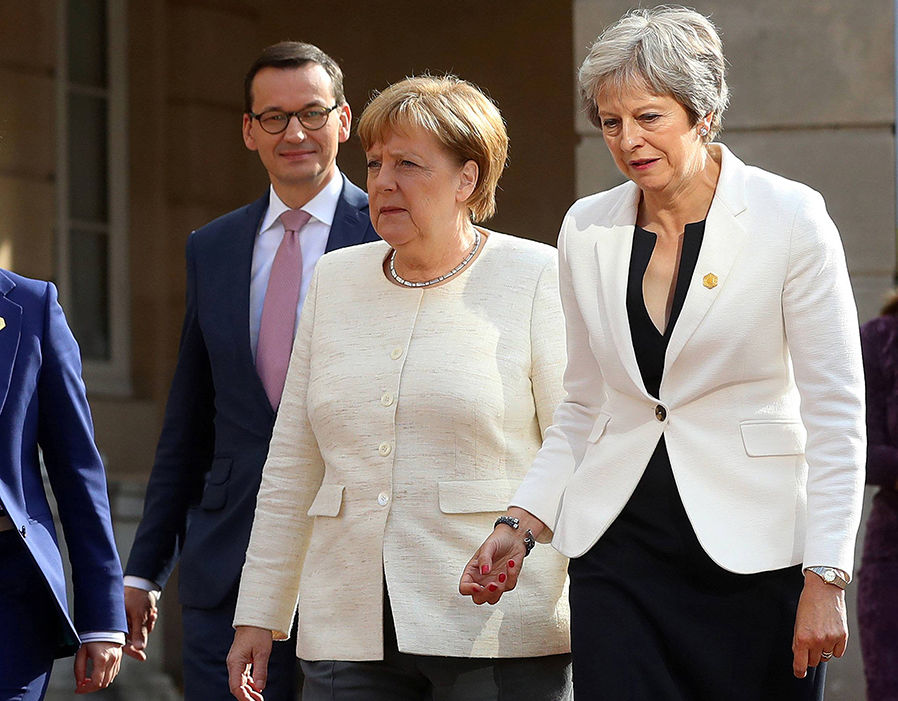[ad_1]
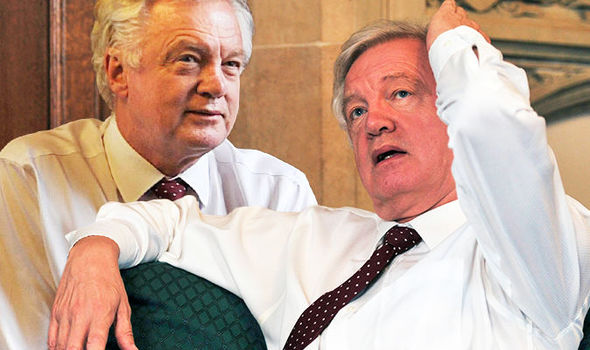
David Davis has urged the Prime Minister to tear up her Brexit White Paper and “start again” (Image: NC)
In his first newspaper interview since standing down as EU exit secretary, the Tory veteran reassures Sunday Express readers that it is not too late to save Brexit.
He calls on Theresa May to accelerate no-deal preparations, insisting leaving on World Trade Organisation terms is “not the end of the world”. With unprecedented candour, the former leadership contender lays bare the details of his short telephone conversation with the Prime Minister after his resignation and reveals how Doreen, his wife of 45 years, persuaded him to leave. Describing the Chequers compromise as “trapping Britain’s fingers in the mangle”, he claims the EU will agree to a better deal as it comes under increasing pressure from the other 27 member states in the autumn.
Unleashing an attack on the Treasury for orchestrating “Project Fear Mark III”, he lays into the Whitehall establishment, accusing it of believing in “nonsensical forecasts” and “patronising” voters.
Vowing to “fight very hard from the outside” for the Brexit 17.4 million people wanted, the former SAS-trained soldier believes the UK would vote 60-40 to leave if there was a second referendum tomorrow.
He also boasts that Dominic Raab, his successor at the Department for Exiting the European Union (Dexeu), is in constant contact, describing him as “my boy”.
In this political interview of the year, he reveals in his own words the inside story of Brexit and what really happened at that dramatic Chequers meeting.
Is the Brexit White Paper “dead”?
We’re going to have to do a reset and come back and look at it all again. What we mustn’t do is leave everything on the table and offer something else on top.
One of the traditional tactics of the EU is to say: “OK, but not enough” and pocket what they’ve already been given. We can’t allow that. We’ll have to say: “Sorry, if that deal’s not enough then it’s no longer available.”
I think when we get to the autumn, if we are in the situation where we don’t have any degree of agreement, we’re going to have to start again.
What should the Prime Minister do next?
I want the Prime Minister to publish a particular project. This was always in my mind as a reserve parachute, what we do if we don’t get a deal.
And basically what we do is take all of the deals that the European Union has struck with Canada, South Korea, South Africa, Switzerland, New Zealand – a whole series of them – and composite the best bits. From both sides, by the way, not just our side.
We produce a 40-page document but then get international lawyers to turn it into a treaty so it would go from 40 pages to hundreds and hundreds of pages, if not thousands.
So that’s on the shelf, come the autumn and if the current arrangements don’t work out, we say: “OK, we’ll retreat from that, we’re asking for a bit less, this is what we’re asking for, every single line of this has been given to somebody else in some treaty somewhere else in the world.”
So that’s what I would call Canada plus, plus, plus.
Because this is a thousand moving parts, it is impossible to tell you the individual way through, there will be half a dozen possibilities. People’s minds change in accordance with the pressure that’s put on them and the more high pressure the negotiation is, the more they’ll look around for other options.
Today, I wouldn’t expect the Government to be particularly welcoming of Canada plus, plus, plus – but I think, come the autumn, we’ll be in a different position.
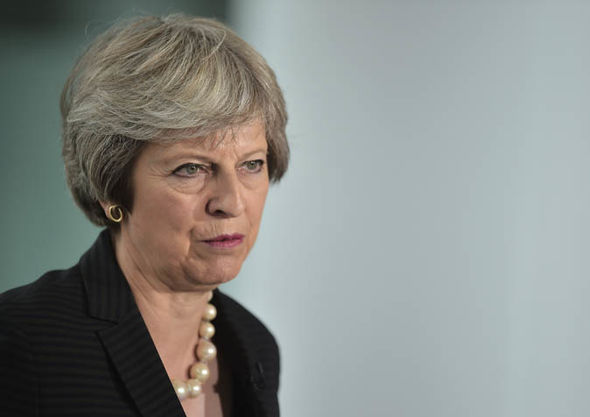
David Davis calls on Theresa May to accelerate no-deal preparations (Image: GETTY)
It’s not too late but we’re going to have to fight very hard from outside to influence the way the Government goes
Is it too late to save Brexit?
It’s not too late but we’re going to have to fight very hard from outside to influence the way the Government goes. Through September and October it’s going to be a very high intensity argument, I think. It’s a terribly self-serving comment but I am reminded of one letter I got from one of the whips commiserating, saying: “I’m very sorry you’re going, etc etc,” and lots of flattering stuff, but the last paragraph said: “But it strikes me you might be more powerful where you are than where you have been before.”
There’s a big hearts-and-minds exercise to do, both with the party in the House and other parties, the DUP, and the Labour members and so on.
At the end of the day, the most testing vote last week was in or out of the customs union and we won it on five votes, thanks to those Labour MPs – and that’s how tight the battle’s going to be.
One of the arguments put after my departure and Boris’s was, well they don’t have an alternative – which is sort of bonkers since we spent seven weeks creating the alternative.
I take the view that leaving on WTO terms will be uncomfortable in the short term but actually perfectly good in the long term – but all of the options, other than the Chequers one, are good in the long term and what we are arguing about is how much short-term discomfort you have.
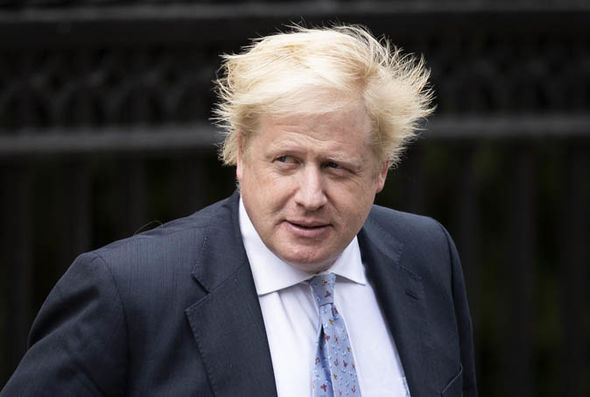
Boris Johnson has resigned as Foreign Secretary (Image: GETTY)
Should we fear “no deal”?
It’s not the best outcome, although people get terribly frightened about it as if it’s the end of the world – it’s nothing like that.
You have the two extremes, you have the utopians and the dystopians. At one end you expect Mel Gibson to walk on stage, at the other it’s all fine, nothing will happen.
If we go to WTO it will be if the negotiations break down, so there will be a degree of hostility. You might see some quite deliberate problems but they won’t last for ever, they’re likely to last months rather than years. It could be weeks or months, who knows? But not very long is the answer.
Why do I say this? Well cast your mind back. What’s the indicator of the problem at Dover? It’s Operation Stack, lorries down the M20. The first thing that tells you is this is not a frictionless border – it gets problems for other reasons.
Sometimes the reasons have been quite long-lasting – 74 times in 20 years. So much for a frictionless border. The last big one was 2015 when there were 31 days of Operation Stack. Nobody liked it, no one would allow it to happen if you could avoid it but we managed to get past it. That’s the first thing to understand.
The people of Kent were quite properly in uproar but nevertheless, it didn’t bring the country to a halt.
Secondly, if this was done deliberately it would be a massive piece of self-harm because if you block the channel port one way, you block it both ways.
It’s a sort of continual circuit so from that point of view, it’s not likely to last very long because you are going to have French farmers in uproar.
The next thing to bear in mind, because people worry most about Dover, is that you can move up to 40 per cent of traffic to other ports. Zeebrugge, Antwerp, Rotterdam all want more trade and they are preparing for this already.
In this world of ours, people never seem to report Brexit good news. There was an NAO [National Audit Office] report recently that the customs software was all on target.
Are we prepared enough for no deal?
Not yet. They need to accelerate. In my view what is currently a “consult and cajole” operation has got to turn into a “command and control” system and I think you’ll see under Dominic [Raab] far more centralisation of control over the course of the summer with Dexeu taking the lead.
By the end of the summer it should be plain we are making proper preparations for this. Frankly if we get to October and it’s not looking good, we should accelerate again – more money, more resources and so on.
I think there’s a fair amount of fear of no deal around the EU. I’ve talked to the politicians in some of the major ports and they’re very concerned. Only this week, Xavier Bertrand, the man who runs Hauts-de-France, which includes Calais and Dunkirk, he said we have to get on with the bilateral planning and he’s saying to the [European] Commission: “You can’t stop us talking to the UK customs authorities any longer.”
So there’s pressure for that already. And I think if we get beyond October, other countries will start to really fear no deal. The Netherlands and Belgium and Ireland will all suffer really quite badly for different reasons. So they won’t want to do it, Sweden won’t want to do it, Spain won’t want to do it.
You go around and each of the member states have their own reasons and they are rational reasons, so I think the pressure on the negotiations will suddenly increase dramatically and the Commission will not be able to stick by its ideological lines.
So far, the Commission sticking by ideological lines hasn’t really cost them very much.
They think they’ve got their money, we think we’ve got our implementation period, we’ve got the citizenship issue sorted out but there’s been no threat to the countries.
If we get to the EU Council meeting and we haven’t got any progress, the threat of no deal will suddenly get very real and I think that’s the point where new ideas will play.
Will the EU eventually do a deal with Britain?
Yes, eventually. But the countries will deal. The Commission will always be the hardliners in this exercise. We did an exercise in March where I did 18 countries in two weeks and it worked – it had an effect on the Council and you could see the results. I often tell the story – many years ago, when I was the Europe minister, there was one particular treaty change which nobody really liked, driven by the French and Germans.
I had the Spanish, Italian and the Danish foreign secretaries all saying to me: “David, you must veto this.” And I said: “Use your own bloody veto! Why should I veto it?” They all said: “You can stand up to the Franco-German axis, we can’t” and that used to be the issue, that France, Germany and the Commission were this sort of unbeatable trio.
We were the only people who would take them on. We’d use our veto and argue and people would sort of stand behind us. Now we’re not there to stand behind and some countries are beginning to become a bit more willing to talk about their own interests.
On the Northern Ireland border issue
It’s not mythical but it’s certainly heavily misunderstood. The point that people forget is that there’s a border there already.
There’s a VAT border, there’s an excise border, there’s a currency border, there’s a legal border and it’s managed perfectly well as it stands by the Irish and the British customs and police authorities together.
One of the problems we have with the Commission is that they don’t trust anybody. It was one of the things that bridled with me early on when [EU negotiator Michel] Barnier said: “You have to earn trust.” And I thought, this country has been earning trust for a long time, it stands by its responsibilities more than most.
With a decent amount of interaction between our agencies and the Irish agencies, it’s manageable. The problem was that in December the Irish government insisted on this phrase “full alignment” and are now trying to use it as a lever.
Of course there are two understandings of full alignment. Our understanding is clear – it’s full alignment of outcomes. That doesn’t create a barrier down the Irish sea. What we can’t say suddenly is, “Oh, it’s going to be in the single market”. That’s an affront to the integrity to the Kingdom.
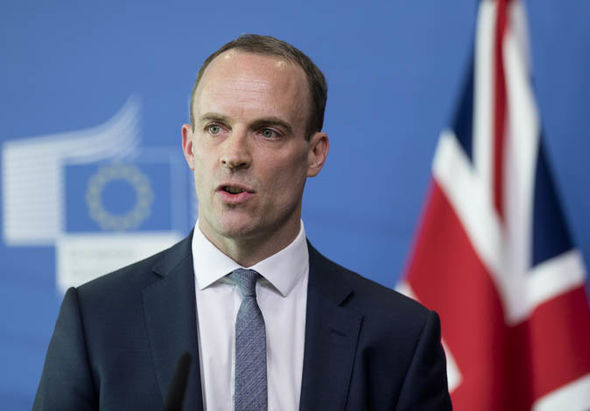
David Davis described Dominic Raab as “my boy” (Image: GETTY)
When did you decide to resign and what was the Prime Minister’s reaction?
She first told me about her plans on the Monday and I told her I didn’t think it was a good idea. I got a written copy about Wednesday lunchtime and fired off a letter back, going through why I thought it was not viable.
I don’t get angry. I’m not an emotional person on these things. I had won most of my arguments but this time I thought, “This can’t work. This can’t fly”.
Then we drafted my speech for Chequers, which started with the words, written across it in my handwriting: “I’m going to be the odd man out, Prime Minister”. I went through why it was wrong in my view, why it couldn’t work because of the phrase I use all the time: “It traps our fingers in the mangle.” And they’ll keep turning the mangle and we’ll never get out, we’ll never get away.
I’ve famously resigned twice, which is obviously excessive, but when I make a big decision I always put two days’ cooling off period in my own mind. So I slept on it for two nights. When I resigned over the civil liberties, the 42 days, I spent a whole weekend sitting in the drawing room of my house in Yorkshire, playing Mozart and drawing out all the possible outcomes, you know, like logic trees on a big piece of paper.
There was nothing quite so complicated needed for this. I didn’t do logic trees for this, it wasn’t necessary. The big things in my mind were: “One: can I stand at the despatch box and say this? And tell the truth?” And the answer’s no. Another thing was: “Other people are depending on my judgment on this.”
I talked it over with my wife and her advice was: “Leave.” Mind you, she’s had to put up with the workload and the absence really.
I don’t talk politics at home much but I did about this. I talked to her, I talked to my chairman on the phone because he was abroad and I talked to my president. I spent an hour with him going through the permutations and he just said: “I’m surprised you waited this long.”
I spoke to the Prime Minister late on Sunday night. She said she was disappointed. She said that twice. It was quite a short conversation really, there was no point stringing it out.
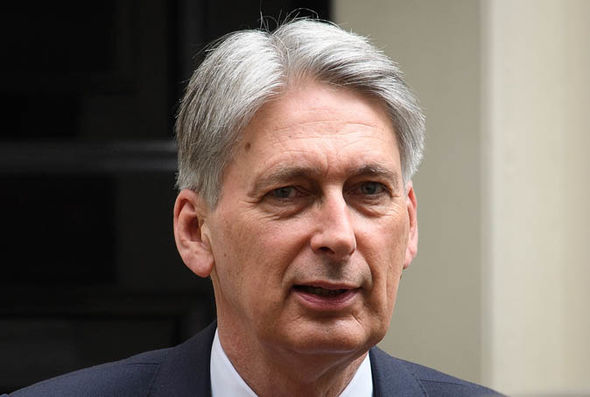
Chancellor of the Exchequer Philip Hammond (Image: GETTY)
Were you relieved?
No, no, no. Although there was a series of internal battles about things, I stuck with it for so long because it’s an incredibly important task.
Who was the biggest thorn in your side, civil servant Olly Robbins or Chancellor Philip Hammond?
Well I don’t think of it that way. You’ve got a Whitehall establishment which putting it mildly, is not an enthusiast for the project. And certainly at the Treasury, which believes all these nonsensical forecasts. Project Fear Mark III, I think it is now.
The Treasury in total believes this stuff and I don’t. I simply think this is mathematical mumbo jumbo.
These are the forecasts which didn’t foresee the banking crisis, that got completely wrong the effect of the referendum.
If you believe the forecasts you tend to get rather frightened of this or that outcome. I think they’re too mechanistic and don’t take into account the way people behave.
You hear a lot of businesses complaining. Fair enough, they’ve got their issues to defend, but a lot are saying: “Where are the opportunities in this, where are we going? Where’s our next export market?” And you can’t model that. You can’t even guess it, frankly.
So you’ve got inevitably a civil service and some of the ministers as well whose primary instinct is to defend what we have. But if we’d spent the last 10 centuries of our history defending what we have, we’d be a very much poorer country if that precludes things that can make us into a great country. We’re going to have a massive growth in services, we are one of the world’s lead service exporters.
Under the Chequers proposal, the rules for those things are going to be written in Brussels. How can you have the rules for your best industries, your future, your champions, written somewhere else?
And how will they write those rules? Well go ask James Dyson. They wrote the rules deliberately to disadvantage him.
Or go and ask the somebody who has got a diesel car that’s not worth very much now because they rigged the rules to suit the German car industry.
Do you want to be the next PM?
I’ve just given up my job, I don’t want another one! We’ve got to get through the next six months, we don’t have time for a leadership contest.
You were accused of being “asleep at the wheel”, “not across the detail” and “lazy”:
Ha! They should talk to my wife!
On Dominic Raab, his successor as Brexit Secretary:
We’ve obviously had conversations. Bear in mind I recruited him into politics in the first place. He’s my boy, as it were and he’s doing the right things.
He’s very clever but he’s also very tough. He’s the best possible replacement for me.
On the PM:
Much more than her predecessor, she takes Cabinet government really seriously – but we’ve got a Cabinet that’s three-quarters Remain.
I actually think she’s a good Prime Minister, she’s well intentioned. When we’ve got a decision or an issue to deal with, she takes her time over it, she reads all the papers, she takes all of the views, consults with everybody and then makes a decision.
The problem with this issue is it’s so complex you’re going to have to trust somebody’s judgment and she chose to trust somebody’s judgment other than mine.
On Boris:
He uses more flowery language than me but he makes the same point. I’ve no idea [if I could back him again]. I did last time. He was the person who I gave my first support for and I was very disappointed when he didn’t run. With a bit of luck, it will be after I’m gone. I intend to stand at the next election, but who knows?
On Michael Gove’s theory that he can “rescue” Brexit in March:
I think it misses the fundamental point which is the Union always uses the agreements it has to expand, not reduce, its power.
If you are a subscriber to “get it done, then fix it later”, what you are really subscribing to is fixing it in 20 years time when the amount of trade we do with Europe is so small it won’t matter any more.
In 20 years we’ll be down to 20 per cent trade with Europe but I didn’t sign up to this to create a 20-year timetable of exit. In a way it’s a self-deception – it’s people trying to rewrite their bit of history to make it sound better than it is.
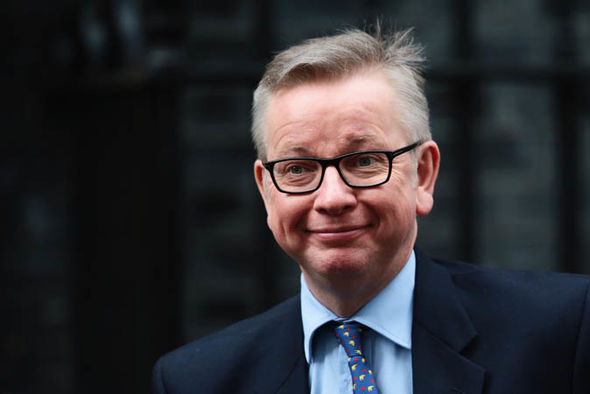
David Davis commented on Michael Gove’s theory that he can “rescue” Brexit in March (Image: GETTY)
On the Remain campaign to reverse the referendum result:
All that continued assault on the outcome is just bogus, patronising nonsense, it really is. And that’s why I think they’ve lost a chunk of the pragmatic Remainer vote.
About a month ago I went for a bicycle ride into Selby, not very far from me. There was a man running, doing his exercise. I stopped to check where I was and he said: “Are you who I think you are?” And I said: “Probably”. He said: “Well, good luck, I’m a Remainer and I cannot stand the way that some of the Remainers are behaving.
“London Remainers are so patronising about us, as though somehow we’ve got a lower IQ than them.”
If there was another referendum tomorrow, would Leave win?
I think they would. I think it would be about 60-40 and there are a number of reasons for it.
Number one, the behaviour of the Commission. One of the tactics I adopted was to be as reasonable as possible, just to make plain we’re not the ones causing trouble. That’s come across.
The second reason is the pragmatic Remainers who don’t like the behaviour of attempting to reverse the referendum. The third… a recent survey saying something like 51 per cent wanted a no deal. This is a sort of annoyance, a “Who do you think you are?” type response.
The trouble with having a second referendum is that it changes the negotiating dynamic, it makes the other side want to give us a harder deal so we’ll stay in.
[ad_2]
